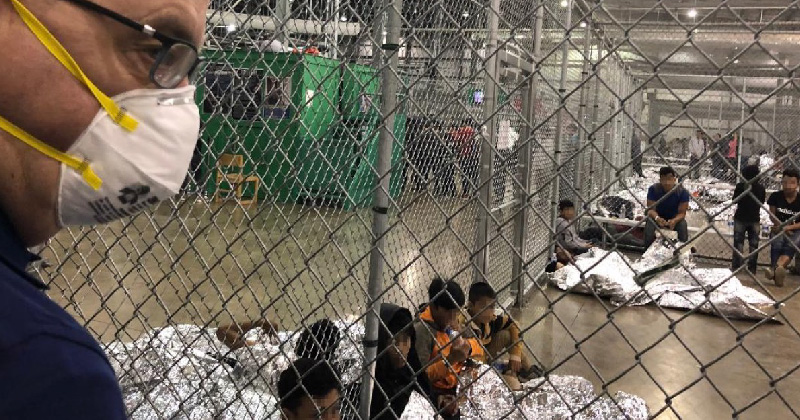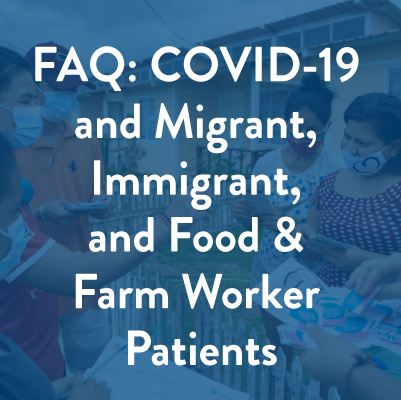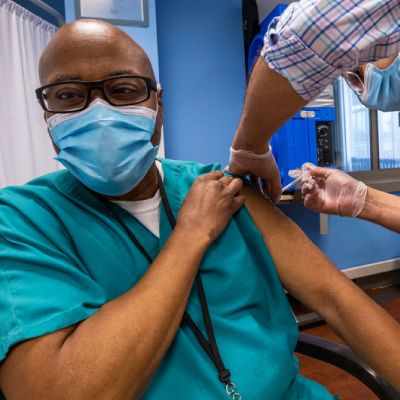- Who We Are
- Clinician Employment
- Publications
- Witness to Witness (W2W)
- Kugel & Zuroweste Health Justice Award
- Your Voice Matters: Photovoice Project
Thu, 04/23/2020 | by MCN Admin

![]()

Representative Jim McGovern visits the Ursula Detention Center in McAllen, TX.
Migrant Clinicians Network calls on immigration authorities to rescind dangerous immigration policies that put refugees and migrants, and border communities, at risk during the COVID-19 pandemic.
In May 2019, the Trump Administration began enforcing the Migrant Protection Protocols (MPP), also called “Remain in Mexico”, which require migrants who cross the border asking for asylum to await their court date in Mexico instead of in the United States. Despite a court order in February 2020 that confirmed that the protocols are legally unsound, the MPP have remained active. Thousands of people waiting in Mexico live in disorganized and underfunded refugee camps, with poor sanitation, limited availability of makeshift shelter and food, and few resources for even basic health care assistance. As the pandemic hit, the limited humanitarian aid that was available has been further reduced, as organizations pull back their staff for their own protection. This has left thousands of migrants and refugees waiting at the US-Mexico border in unsafe and unhygienic conditions, many with chronic or ongoing health conditions that make them more vulnerable to COVID-19.
Across the border, US Immigrations and Customs Enforcement (ICE) continues to detain thousands of asylum seekers. Under MPP, many of those who are detained in the US and avoid removal to Mexico are those who have ongoing health needs, including pregnant women and their families, and people of all ages with serious medical conditions. ICE detainees are dangerously at risk for COVID-19. As in other residential facilities with close quarters, COVID-19 can spread quickly, which may overwhelm local emergency rooms and health services, which further endangers local communities and strains our health care system.
In a joint press release on March 31, the World Health Organization, the UN High Commissioners on Refugees, International Organization for Migration, and the Office of the High Commissioner on Human Rights strongly stated that “the rights and health of refugees, migrants, and stateless must be protected in COVID-19 response.” Alternatives to MPP and the detention of asylum-seeking individuals and families exist and can be safely conducted to protect public health and also to safeguard the lives of asylum-seeking men, women, and children on the southern border. Physicians for Human Rights and Human Rights Watch are including recommendations and guidelines for initiating these safeguards in their outreach materials.
Programs exist that could initiate these safeguards immediately. MCN has been instrumental in creating one of the first on the border: the Humanitarian Care Network (HCN), a program of Migrant Clinicians Network in conjunction with Catholic Charities of the Rio Grande Valley, the University of Texas, Rio Grande Valley School of Medicine, Stanford University, College of Medicine, and Baylor College of Medicine/Texas Children’s Hospital. HCN is housed within the Humanitarian Respite Center (HRC). The HRC is a program of Catholic Charities of the Rio Grande Valley that receives asylum seekers who have been newly released from detention. HRC provides basic needs like food and clothing, and HCN triages asylum seekers to determine and meet their basic and urgent health needs. When the asylum seeker is ready to move on from the HRC, MCN’s Health Network provides case management to link asylum seekers with ongoing health needs to care in their receiving community. Humanitarian Care Network can be instrumental both to ensure basic human rights are met and to stop the spread of COVID-19:
- HRC in McAllen, Texas, provides hot meals, bathing facilities, sleeping mats for those staying overnight, a change of clothes, and orientation for travel in the US. There is space within the Humanitarian Respite Center to isolate or quarantine asylum-seeking families.
- A fully equipped and staffed clinic, created within the HRC this year through the Humanitarian Care Network provides acute medical care to immigrant families. Health screening and COVID-19 testing is already being done in the Respite Clinic.
- MCN’s Health Network then provides case management to asylum-seeking families as they travel to their new communities across the US. Most of the asylum-seeking families have sponsors or families in this country ready to assist them. Working with its partners, MCN helped create a network of academic medical institutions and clinics in the top destination communities for immigrants to serve those immigrants with the most urgent medical needs, such as pregnant mothers and their unborn babies and children with special health care needs. MCN’s Health Network will hold the first repository in the country of health information on newly migrated families. Health Network has the capacity and expertise to expand its work to meet case management needs that arise from the pandemic.
“We have two vulnerable populations: one held in tents and another in detention. Solutions exist. What we need now is solidarity and action. Thanks to MCN and our partners, we are ready to respond,” declared Marsha Griffin, MD, Chair Emeritus of Migrant Clinicians Network’s Board of Directors and director of MCN’s Rio Grande Valley Health Network team.
MCN’s Chief Medical Officer, Laszlo Madaras, MD, MPH works directly with COVID-19 patients in a community hospital which serves a migrant farmworker population. “I have seen in real time how quickly rural hospitals have become overwhelmed with very sick patients,” Dr. Madaras said. “ICE detainees are at increased risk of getting COVID-19 and may not get appropriate care as rapidly as needed to prevent death."
Migrant Clinicians Network calls on US authorities to place public health at the highest priority by responding to the border humanitarian crisis and to provide for the basic health needs of asylum seekers. To this end, ICE must immediately enact alternatives to detention for those currently in custody, with the highest priority for medically vulnerable detainees. Further, MPP must be halted, and measures must be put into place to protect the health of asylum seekers who are waiting in Mexico and allow them to enter the United States under the guidelines recommended by the Physicians for Human Rights and Human Rights First.
Like what you see? Amplify our collective voice with a contribution.
Got some good news to share? Contact us on our social media pages above.
Return to the main blog page or sign up for blog updates here.







